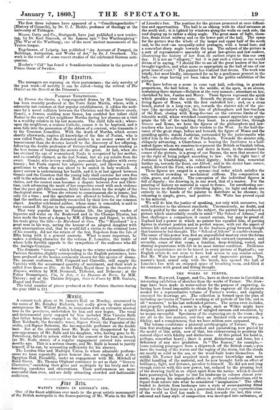3rts.
WATTS'S FRESCO IN LINCOLN'S INN.
One of the finest additions ever made to the great artistic monuments Of the British metropolis is the fresco-painting of Mr. Watts in the Hall of Lincoln's Inn. The position for the picture presented at once difficul- ties and opportunities. The hall is an oblong, with its chief entrance at the south end; it is lighted by windows along the vralls on each aide the
roof sloping up to rather a sharp angle. The great ma sa of light, these- fore, floats about midway and on the lower part of the hall. The spate for the picture was the whole of the larger and upper half of the south
end, to the roof—an unequally-sided pentagon, with a broad base, and a somewhat sharp angle towards the top. The subject of the picture is a sort of representative assembly of great law-givers and law-makers, illustrating the history of law from ifs earliest origin to this our own day. It is not an " allegory," but it is just such a vision as one would
dream of in saying, "I should like to see all the great leaders of the law brought together, and what scene so appropriate as the hall of one of our great inns of court." The painter has realized that dream. The work was briefly, but most kindly, interpreted for us by a gentleman present in the hall,—no steps having yet been taken for the public exhibition of the picture.
We have before us a scene in some vast hall, reflecting, in grander proportions, the hall below. In the middle, at the apex, is an alcone, containing three statues—Religion at the very summit ; attendant on her, cherished by her, Justice and Mercy. These figures represent the spirit which presides over the scene. beneath the groupe of statues is the living figure of Moses, with the first embodied law ; and, on a stone bench, seated in a long row, are, towards the sinister side of the pic- ture [the spectator's right) the line of philosophers and law-teachers of the East, closing with right), on the extreme limits of the tolerable world, whose wretched countrymen cannot appreciate or appro- priate the life of the teaching they boast. In a similar line, through Greece and Rome, we have the figures of the philosophers and law- teachers who have brought their wisdom to the West. In the half-dis- tance of the great stage, before and beneath the figure of Moses and the presiding spirits, stands Justinian, surrounded by the jurisconsults who aided him in the collection of the Pandects. Towards the sinister side, obliquely advancing, a Churchman is bearing the Institutes to a half- naked figure whom we construe to represent the British or Gaulish tribes, a Scandinavian standing next; and down in front, in the sinister base corner of the picture, is a group of our Barons, the men that secured for us the right of being judged according to law. On the eight hand of Justinian is Charlemagne, in robed dignity; behind him, somewhat further on, towards the front, our Alfred ; and in the dexter base corner, seated, Edward the First, who confirmed the Charter. These figures are ranged in a syminel deal order which satisfies the eye, without crowding or mechanical stiffness. The composition is calm, grave, and stately. The conception of the individual figures is full of dignity; the drawing is' in one word, that of a master. For the painting of history no material is equal to fresco. Its unreflecting sur- face knows no disturbance of obtruding lights ; its light and shade are entirely in.the hands of the painter to distribute as he chooses ; its colouring is simple, grave, and positive. Mr. Watts has proved equal to his material.
We will do him the justice of speaking, not only with unreserve but with reference to the sternest standards. Unconsciously, no doubt; and merely guided by the nature of the subject, the painter has produced a picture which unavoidably recalls to mind "The School of Athens," and thus challenges a comparison it cannot sustain, but may be proud of. Raphael had a power in which no painter has equalled ham, of putting figures in abstract position and in perfect repose, with yet the aspect of intense life and animated interest in the business going forward, though that business be but thought. The School of Athens" is a noble example. The cause of this power was, first an unparalleled mastery over the forms and traits characteristic of organic life and its outward expression and secondly, cause of that cause, a familiar, deep-drinking, varied; and sharing acquaintance with life in its most intense condition. Evidences of that acquaintance are to be traced in every picture of Raphael's' our English artists do not seem to have had access to any similar school. But Mr. Watts has produced a great and impressive picture. The master's hand, armed only with the brush, has opened the hall of Lincoln's Inn with an enlarged space of breathing room, and filled it for evermore with grand and fitting thought.


























 Previous page
Previous page